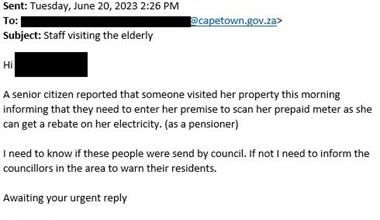As technology progresses, scammers are also finding new ways to trick unsuspecting residents, particularly the elderly, with their fraudulent schemes. Recently, two new electricity scams have emerged, which residents must be aware of to avoid falling victim to these ploys.
The First Scam: Sale of Counterfeit Electricity Units
The first scam involves the sale of counterfeit electricity units. Scammers sell these units at low prices, which can be tempting for residents looking to save money. However, purchasing these units can have dire consequences. To avoid being a victim of this scam, residents should only purchase legitimate electricity units at the correct price per unit.
The Second Scam: Criminals Posing as City Officials
In the second scam, criminals pose as city officials or contractors to gain access to homes. Once inside, they steal small personal items, with senior citizens being the primary targets. Scammers use common pretenses, such as claiming that they need to scan a prepaid meter to provide a rebate on electricity, to gain entry into homes under false pretenses.
Protecting Oneself from These Deceptive Practices
To protect oneself from these deceptive practices, residents must be vigilant and verify the credentials of any individual claiming to be a city official or contractor. The City’s Electricity Generation and Distribution Department always schedules an appointment before visiting a home. Municipal workers and contractors must carry a work order number specific to the dwelling and a legitimate City-issued identification card.
Residents should always ask to see both the work order number and the identification card before allowing anyone access to their property. A valid identification card must display the City logo, the name and surname of the staff member or mandated contractor, and an embedded photo of the individual. If in doubt, residents should call the City’s Call Centre at 0860 103 089 to verify the card’s legitimacy.
If residents notice any suspicious behavior, they must report it immediately to the City’s law enforcement agencies, the City’s Fraud Hotline at 0800 1100 77, or the South African Police Service (SAPS), which is the leading authority in crime prevention.
Summary: Tips to Protect from Electricity Scams
Residents must follow the following tips to safeguard themselves from electricity scams:
- Only buy legitimate electricity units at the correct price per unit.
- Be aware that pensioner support qualification requires submitting an application form.
- Always verify the work order number when an official visits your home.
- Check the official’s City-issued identification card.
- Ensure the ID card displays the City logo, the name and surname of the staff member or mandated contractor, and contains an embedded photo of the individual.
- If unsure, call the City’s Call Centre at 0860 103 089.
- Report suspicious behavior to the City’s law enforcement agencies or the SAPS.
By staying informed and alert, residents can protect themselves and their homes from these fraudulent schemes. Education and awareness are the best defenses against scammers and their ever-evolving tactics.








